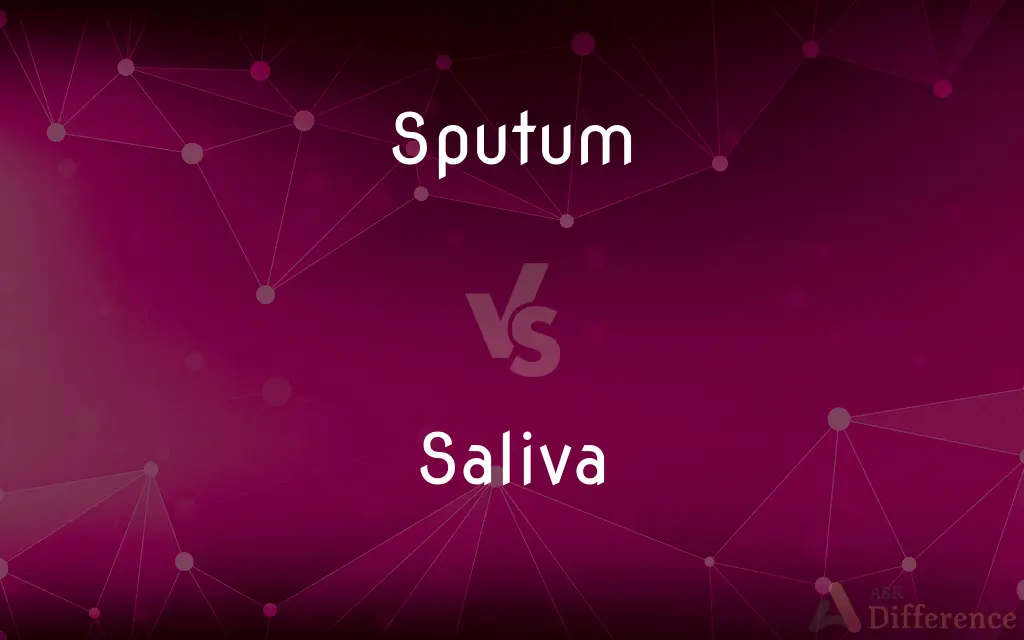Sputum vs. Saliva — What's the Difference?
By Tayyaba Rehman & Fiza Rafique — Updated on March 11, 2024
Sputum is mucus expelled from the respiratory tract, used for diagnosis, while saliva is a digestive fluid in the mouth, aiding in taste and digestion.

Difference Between Sputum and Saliva
Table of Contents
ADVERTISEMENT
Key Differences
Sputum is produced within the respiratory system, specifically when there is an infection or irritation, capturing pathogens and debris from the lungs and airways. It's often used in medical diagnostics to identify respiratory diseases. On the other hand, saliva is secreted by the salivary glands in the mouth, playing a crucial role in beginning the digestive process, maintaining oral hygiene, and facilitating taste.
While sputum is not continuously produced and is usually a sign of disease or infection, saliva is constantly produced, necessary for lubricating the mouth, aiding in speech, and beginning the breakdown of carbohydrates with the enzyme amylase.
Sputum collection is typically done through coughing deeply to bring up material from the lungs, whereas saliva can be easily collected by spitting or drooling, showcasing the difference in their origins and methods of collection.
The analysis of sputum can reveal a lot about respiratory health, including the presence of bacteria, viruses, or cancerous cells, making it valuable for diagnosing conditions like tuberculosis, pneumonia, and bronchitis. Saliva analysis, however, can provide insights into oral health, systemic diseases, hormonal levels, and drug use.
Despite their differences, both sputum and saliva play significant roles in the body's defense mechanisms. Sputum traps and removes pathogens from the respiratory tract, while saliva contains antibodies and enzymes like lysozyme that help control bacterial growth in the mouth.
ADVERTISEMENT
Comparison Chart
Definition
Mucus expelled from the lower respiratory tract.
Fluid produced by salivary glands in the mouth.
Primary Function
Traps and removes pathogens and debris from the lungs.
Aids in digestion and maintains oral hygiene.
Production Site
Lower respiratory tract (lungs, bronchi).
Salivary glands in the mouth.
Role in Diagnosis
Used to diagnose respiratory diseases.
Used for oral health and systemic disease indicators.
Collection Method
Through deep coughing.
Spitting or drooling.
Compare with Definitions
Sputum
Produced when coughing.
Sputum production increases with respiratory infections.
Saliva
A digestive fluid produced in the mouth.
Saliva begins the process of breaking down food.
Sputum
Reflective of lung health.
The color of sputum can suggest different types of lung conditions.
Saliva
Contains enzymes like amylase.
Saliva's amylase starts the digestion of starches.
Sputum
Expelled material from the lungs.
Sputum often contains pathogens, indicating illness.
Saliva
Constantly produced.
The body produces saliva to keep the mouth moist and aid digestion.
Sputum
A mixture of saliva and mucus coughed up from the respiratory tract.
The doctor examined the sputum sample for signs of infection.
Saliva
Essential for oral hygiene.
Saliva helps clean the mouth and prevent tooth decay.
Sputum
A diagnostic tool for respiratory diseases.
Sputum tests can detect tuberculosis bacteria.
Saliva
Aids in taste and speech.
Saliva is necessary for dissolving food particles for tasting.
Sputum
Sputum is mucus that is coughed up from the lower airways (the trachea and bronchi). In medicine, sputum samples are usually used for naked eye exam, microbiological investigations of respiratory infections and cytological investigations of respiratory systems.
Saliva
Watery liquid secreted into the mouth by glands, providing lubrication for chewing and swallowing, and aiding digestion.
Sputum
Matter coughed up and usually ejected from the mouth, including saliva, foreign material, and substances such as mucus or phlegm, from the respiratory tract.
Saliva
The watery mixture of secretions from the salivary and oral mucous glands that lubricates chewed food, moistens the oral walls, and contains ptyalin.
Sputum
(physiology) Matter coughed up and expectorated from the mouth, composed of saliva and discharges from the respiratory passages such as mucus, phlegm or pus.
Saliva
(physiology) A clear, slightly alkaline liquid secreted into the mouth by the salivary glands and mucous glands, consisting of water, mucin, protein, and enzymes. It moistens the mouth, lubricates ingested food, and begins the breakdown of starches.
Sputum
That which is expectorated; a salival discharge; spittle; saliva.
Saliva
The secretion from the salivary glands.
Sputum
Expectorated matter; saliva mixed with discharges from the respiratory passages; in ancient and medieval physiology it was believed to cause sluggishness
Saliva
A clear liquid secreted into the mouth by the salivary glands and mucous glands of the mouth; moistens the mouth and starts the digestion of starches
Common Curiosities
What roles does saliva play in the body?
It helps in digestion, oral health, taste, and speech, and provides enzymes and antibodies for food breakdown and bacterial control.
What does sputum analysis reveal?
It can reveal the presence of pathogens, such as bacteria and viruses, and conditions like pneumonia or tuberculosis.
Can saliva indicate health conditions?
Yes, saliva tests can indicate oral health status, systemic diseases, hormonal levels, and drug use.
What is sputum?
Sputum is mucus coughed up from the lower respiratory tract, used for diagnosing respiratory conditions.
How is saliva collected for tests?
It can be easily collected by spitting or drooling into a container.
How is sputum produced?
It's produced in response to infection or irritation in the lungs and bronchial tubes.
What is saliva?
Saliva is a fluid produced by the salivary glands in the mouth, aiding in digestion and oral hygiene.
Are sputum and saliva the same?
No, sputum is specifically related to the respiratory tract and indicates health issues, whereas saliva is produced in the mouth for digestion and hygiene.
What enzymes are found in saliva?
Amylase is a key enzyme in saliva that starts the breakdown of carbohydrates.
Why is saliva testing preferred for some diagnoses?
It's non-invasive, easily collected, and can provide valuable health information.
Why is sputum sometimes colored?
The color can indicate different conditions; for example, yellow or green sputum suggests infection.
How can sputum help in diagnosing lung cancer?
Analysis can detect abnormal cells that might indicate lung cancer.
Can dehydration affect saliva production?
Yes, dehydration can lead to reduced saliva production, affecting digestion and oral health.
What makes sputum production increase?
Respiratory infections, irritants, or conditions like chronic bronchitis can increase sputum production.
How does saliva protect teeth?
It neutralizes acids produced by bacteria in plaque, helping to protect against tooth decay.
Share Your Discovery

Previous Comparison
Gangster vs. Hood
Next Comparison
Hipster vs. NerdAuthor Spotlight
Written by
Tayyaba RehmanTayyaba Rehman is a distinguished writer, currently serving as a primary contributor to askdifference.com. As a researcher in semantics and etymology, Tayyaba's passion for the complexity of languages and their distinctions has found a perfect home on the platform. Tayyaba delves into the intricacies of language, distinguishing between commonly confused words and phrases, thereby providing clarity for readers worldwide.
Co-written by
Fiza RafiqueFiza Rafique is a skilled content writer at AskDifference.com, where she meticulously refines and enhances written pieces. Drawing from her vast editorial expertise, Fiza ensures clarity, accuracy, and precision in every article. Passionate about language, she continually seeks to elevate the quality of content for readers worldwide.















































